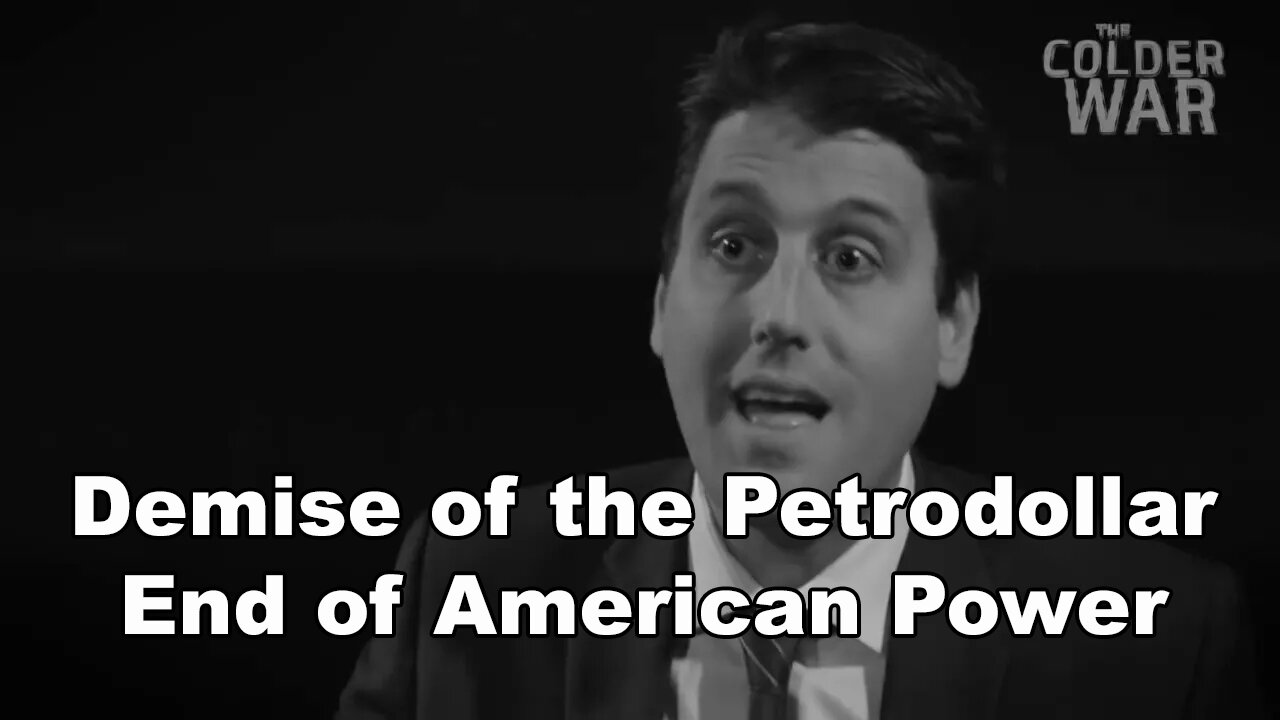Premium Only Content

Demise of the Petrodollar and the End of American Power
Demise of the Petrodollar and the End of American Power
Nov. 25, 2014
The Colder War by Marin Katusa
Marin Katusa's blockbuster New York Times best-selling book, "The Colder War: How the Global Energy Trade Slipped from America's Grasp."
In NATO too there is confusion that occasionally threatens to break into open discord. Of the 28 NATO members, only 14 are involved at all in the Libyan campaign, and only six are involved in the air war. Of these only three countries, the U.S., Britain, and France, are offering tactical air support to the rebels on the ground. When many NATO countries froze the bank accounts of Gaddafi and his immediate supporters, the US, in an unpublicized and dubious move, froze the entire $30 billion of Libyan government funds to which it has access.
Germany, the most powerful NATO nation after America, abstained on the UN Security Council resolution; and its foreign minister, Guido Westerwelle, has since said, “We will not see a military solution, but a political solution.
Such chaos would have been unthinkable in the high period of US dominance. Obama appears paralyzed by the gap between his declared objective, the removal of Gaddafi from power.
The record of ongoing US military invasions in Iraq and Afghanistan suggests that we should expect a heavy human toll if the current stalemate in Libya either continues or escalates further.
The Role in this War of Oil and Financial Interests
In the final stages of hegemonic power, one sees more and more naked invasion for narrow interests, abandoning earlier efforts towards creating stable international institutions. Consider the role of the conspiratorial Jameson Raid into the South African Boer Republic in late 1895, a raid, devised to further the economic interests of Cecil Rhodes, which helped to induce Britain’s Second Boer War.10 Or consider the Anglo-French conspiracy with Israel in 1956, in an absurd vain attempt to retain control of the Suez Canal.
Then consider the lobbying efforts of the oil majors as factors in the U.S. war in Vietnam (1961), Afghanistan (2001), and Iraq (2003).11 Although the role of oil companies in America’s Libyan involvement remains obscure, it is a virtual certainty that Cheney’s Energy Task Force Meetings discussed not just Iraq’s but Libya’s under-explored oil reserves, estimated to be around 41 billion barrels, or about a third of Iraq’s.
Afterwards some in Washington expected a swift victory in Iraq would be followed by similar US attacks on Libya and Iran. General Wesley Clark told Amy Goodman on Democracy Now, that soon after 9/11 a general in the Pentagon informed him that several countries would be attacked by the U.S. military. The list included Iraq, Syria, Lebanon, Libya, Somalia, Sudan, and Iran.
In May of 2003 John Gibson, chief executive of Halliburton's Energy Service Group, told International Oil Daily in an interview, “”We hope Iraq will be the first domino and that Libya and Iran will follow. We don't like being kept out of markets because it gives our competitors an unfair advantage.”
It is also a matter of public record that the UN no-fly resolution 1973 of March 17 followed shortly on Gaddafi’s public threat of March 2 to throw western oil companies out of Libya, and his invitation on March 14 to Chinese, Russian, and Indian firms to produce Libyan oil in their place.15 Significantly China, Russia, and India (joined by their BRICS ally Brazil), all abstained on UN Resolution 1973.
The issue of oil is closely intertwined with that of the dollar, because the dollar’s status as the world’s reserve currency depends largely on OPEC’s decision to denominate the dollar as the currency for OPEC oil purchases. Today’s petrodollar economy dates back to two secret agreements with the Saudisin the 1970s for the recycling of petrodollars back into the US economy. The first of these deals assured a special and on-going Saudi stake in the health of the US dollar; the second secured continuing Saudi support for the pricing of all OPEC oil in dollars. These two deals assured that the US economy would not be impoverished by OPEC oil price hikes. Since then the heaviest burden has been borne instead by the economies of less developed countries, who need to purchase dollars for their oil supplies.
As Ellen Brown has pointed out, first Iraq and then Libya decided to challenge the petrodollar system and stop selling all their oil for dollars, shortly before each country was attacked.
https://rumble.com/vxh975-demise-of-the-petrodollar-and-the-end-of-american-power.html
https://www.bitchute.com/video/AMp7q5E15UZm/
Visit: https://www.colderwar.com
-
 LIVE
LIVE
MissesMaam
3 hours agoCan We Find All The Artifacts ?!? 💚✨
68 watching -
 LIVE
LIVE
Damysus Gaming
1 hour agoDune: Awakening - The Grind Continues - Pushing to Complete More Story Night 3!!!
73 watching -
 2:44:54
2:44:54
vivafrei
12 hours agoEp. 272: Epstein Debacle Continues! Federal Courts Still Going Rogue! Russia-Gate Exposed & MORE!
282K159 -
 3:45
3:45
Blackstone Griddles
7 hours agoSimple Smashburgers with Burger Sauce on the Blackstone Griddle
24.1K8 -
 LIVE
LIVE
NeoX5
7 hours agoThe Fastest Player Around! | Part 1 | Summer Gaming Ep 21 | Rumble Gaming
28 watching -
 LIVE
LIVE
iCheapshot
2 hours ago $0.03 earnedTony Hawk 3+4 Type Ishh
30 watching -
 15:45
15:45
The Car Guy Online
7 hours ago $1.88 earnedGM’s ‘Own Nothing, Be Happy’ Plan! Former Engineer Blows Whistle.
18.4K10 -
 8:48
8:48
Millionaire Mentor
10 hours agoBrandon Gill DESTROYS Kaitlan’s TRAP Question in One BRUTAL Sentence
20.1K16 -
 1:07:49
1:07:49
Jeff Ahern
8 hours ago $14.37 earnedThe Sunday Show with Jeff Ahern
55.2K33 -
 LIVE
LIVE
Spartan
4 hours agoPro Halo Player | Ranked
78 watching